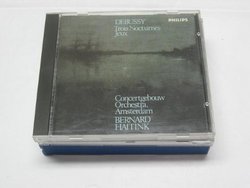| All Artists: Debussy, Haitink, Cgb Title: Jeux / Nocturnes Members Wishing: 0 Total Copies: 0 Label: Polygram Records Release Date: 10/25/1990 Genre: Classical Styles: Ballets & Dances, Ballets, Historical Periods, Modern, 20th, & 21st Century Number of Discs: 1 SwapaCD Credits: 1 UPC: 028940002328 |
Search - Debussy, Haitink, Cgb :: Jeux / Nocturnes
 | Debussy, Haitink, Cgb Jeux / Nocturnes Genre: Classical
|
Larger Image |
CD Details |
CD ReviewsGAMES AND AWARDS DAVID BRYSON | Glossop Derbyshire England | 01/24/2007 (5 out of 5 stars) "The playing time of this disc amounts to very little more than 40 minutes. However I still feel I must go for a 5-star rating, provided of course the price is not unreasonable. A quarter of a century or so ago, this orchestral concert of Debussy won awards from The Gramophone not just in the orchestral category but for the quality of the recording in addition, and it would stand a fair chance of getting similar awards even today. Perhaps I have been unlucky to a certain extent, but I'm rarely satisfied with performances I hear of Debussy's marvellous orchestral works, whereas when it comes to this disc I experience a rare satisfaction indeed.
Debussy's `nocturnes' do not remind one of Chopin's or Faure's, and this is not surprising as the composer availed himself of the term as used by the painter Whistler. Fetes in particular is conspicuously un-nocturnal in the ordinary sense, but Clouds and Sirens are not things we normally think of as having something of the night about them either. They are three miniature tone poems, the longest taking hardly more than 10 minutes, and their proper expression in performance calls for a particularly difficult combination of impressionism with clarity in the sound. It amounts to a considerable challenge for recording engineers certainly, but their best efforts, in my own experience, would go for nothing anyway, as it is only once in a blue moon that conductor and orchestra (plus in Sirenes a voiceless choir) get the thing absolutely right themselves. And that is why I am not troubled by any sense of short measure here - Haitink and his Amsterdam forces pull off something approaching perfection, and if I had to demonstrate to any novice among music-lovers just why I think Debussy the toweringly great composer that I do think him, I believe that these performances might be where I would start my demonstration, certainly at the moment when they are fresh in my memory. Everything seems to be just right - tempi, tone-quality, orchestral refinement, rubato, the colour-mixing in this very complex and subtle orchestral palette, the choral tone, the balance among the orchestral and vocal forces, the expressive cantabile of the voices - everything. I had been familiar earlier with Haitink's Jeux, which I own on a mixed Debussy disc from a variety of conductors. This is a late work, and probably not the easiest of Debussy's orchestral masterpieces to come to terms with at first, just as his Etudes are not the most immediately ingratiating of his piano compositions. If Jeux is unfamiliar to you, please take my assurance for it that it amply repays the effort of getting to know it. It is the music of a short ballet about three young people and a lost tennis-ball in the twilight, the theme is alive with unstated eroticism, and apparently Debussy disapproved to some extent, his disapproval greatly increased when he saw Nijinsky's subsequent choreography. I had never thought of Debussy as exceptionally prudish I must say, but Miss Brodie's `Do as I say and not as I do' was never restricted to Miss Brodie, nor to Debussy neither. This really is music wrapped in darkness and shadows this time. In spite of knowing it, and knowing it in this performance at that, for quite a while I sense that I am only gradually penetrating the penumbra around it. As a musical experience it is intriguing and unusual, I shall at this stage risk saying that I sense that Haitink is a good guide to and through it, and the addition of this odd, complex and fascinating short piece makes the short duration of the disc as a whole completely acceptable to me - I don't want any fillers after Jeux. Performance and recording seem to me to be a single unity here, not separate aspects to be separately assessed, and in this music more than in most that is a basic requirement. For lovers of Debussy, for lovers of great and subtle music, but I'd say for newcomers to the scene as well. After all these years my own musical maturity has taken a great step forward just from knowing these accounts, and I only wish I had got to this point a lot sooner." |

 Track Listings (4) - Disc #1
Track Listings (4) - Disc #1